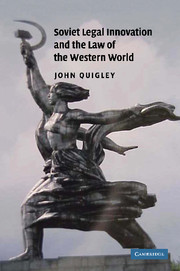Book contents
- Frontmatter
- Contents
- Abbreviations
- Preface
- Acknowledgments
- PART ONE THE SOVIET CHALLENGE
- PART TWO THE WEST ACCOMMODATES
- PART THREE THE BOURGEOIS INTERNATIONAL ORDER
- PART FOUR LAW BEYOND THE COLD WAR
- 21 Triumph of Capitalist Law?
- 22 The Moorings of Western Law
- 23 The Impact of Change
- Notes
- Bibliography
- Index
23 - The Impact of Change
Published online by Cambridge University Press: 27 July 2009
- Frontmatter
- Contents
- Abbreviations
- Preface
- Acknowledgments
- PART ONE THE SOVIET CHALLENGE
- PART TWO THE WEST ACCOMMODATES
- PART THREE THE BOURGEOIS INTERNATIONAL ORDER
- PART FOUR LAW BEYOND THE COLD WAR
- 21 Triumph of Capitalist Law?
- 22 The Moorings of Western Law
- 23 The Impact of Change
- Notes
- Bibliography
- Index
Summary
Law did not wither away in the West, but important innovations were introduced, turning the law in directions that brought features commonly identified as distinguishing the law of the twentieth century from that of the nineteenth. The state assumed a role in society it had not previously taken. The state came to be responsible for the well-being of the citizenry in many aspects of life: for ensuring delivery of health care, for ensuring full employment, for providing security in old age.
The state also came to be responsible for ensuring the equality of citizens, not only before state agencies, but in the realm of relations between individuals and business entities. Discrimination on the basis of race or other status came to be prohibited, whether by the state or by employers. Even when by private employers, the state was viewed as having a responsibility. The state should not allow discrimination by private employers.
The state took on responsibility for the safety of workers from hazards on the job, from the vicissitudes of the market that might result in employment. A worker dismissed by an employer would be entitled to be paid a salary for a time after being dismissed, by way of unemployment compensation.
The state provided for a “safety net” for the citizenry, to avert extreme poverty. Although this responsibility came to be handled variously in different Western countries, a general obligation of the state was recognized.
The Route of Change
No one has a patent on ideas.
- Type
- Chapter
- Information
- Soviet Legal Innovation and the Law of the Western World , pp. 188 - 194Publisher: Cambridge University PressPrint publication year: 2007



